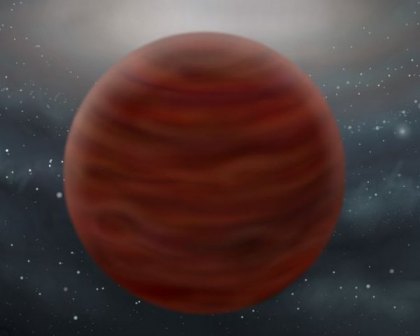Record-breaking 'brown dwarf' star identified

A brown dwarf is a star too small for nuclear fusion.
Artist's Concept: John Pinfield.
The star, found 750 light-years away in the constellation of Pisces, is described in an article published in the Monthly Notices of the Royal Astronomical Society. It has a mass equivalent to 90 times that of Jupiter, making it the most massive brown dwarf found to date, according to the Royal Astronomical Society. Labeled “SDSS J0104+1535,” the star consists of more than 99.99 percent hydrogen and helium. Researchers believe it formed about 10 billion years ago.
A brown dwarf star is, by definition, too small for the nuclear fusion of hydrogen to helium but significantly more massive than planets, the society's website explains. These stars are considered the "missing link" between planets and gas giants such as Jupiter, according to NASA. Although some may have diameters similar to Jupiter, brown dwarfs have more mass and possibly planetary systems.
A 2009 article on the space agency's website explains that because brown dwarfs are the smallest and coolest stars, they are “nearly impossible to see in visible light, but stand out when viewed in infrared.”
Our sun, in contrast, is known as a yellow dwarf and is considered a medium-sized star. The most common stars in the universe are "red dwarfs," the smallest hydrogen-burning stars.
ZengHua Zhang, an astrophysicist with the Institute of Astrophysics in the Canary Islands, led the research. In an article on the Royal Astronomical Society's website, he predicts that the discovery will lead other researchers to find more brown dwarfs.
Related:
In brief: Hubble finds planet orbiting two stars
Mystery star dims, baffles scientists
Jumbo Earth-like planet orbits star
Follow StudyHall.Rocks on Twitter.
If you would like to comment, give us a shout, or like us on Facebook and tell us what you think.

